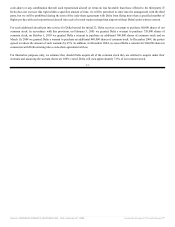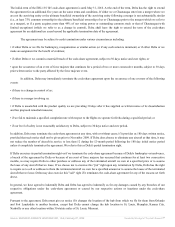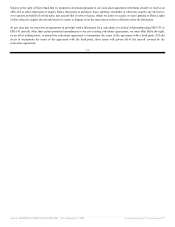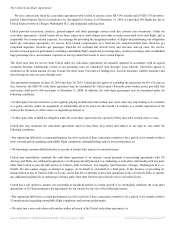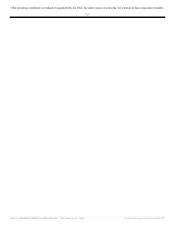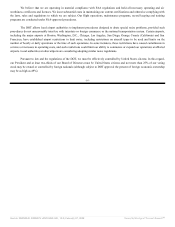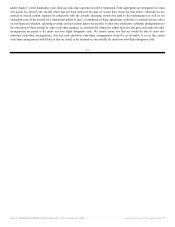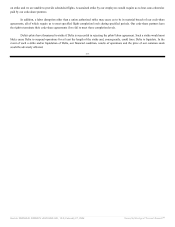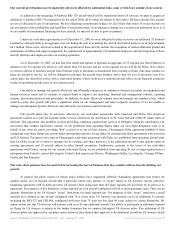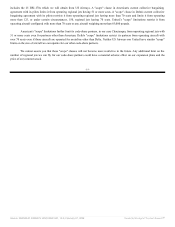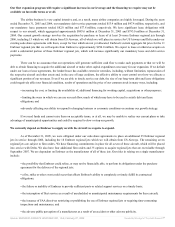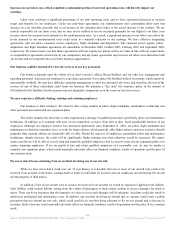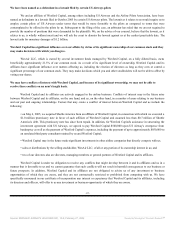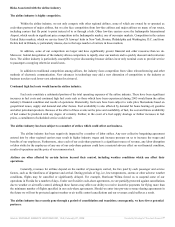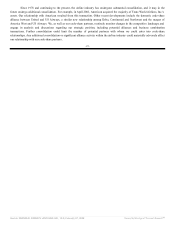Frontier Airlines 2005 Annual Report Download - page 33
Download and view the complete annual report
Please find page 33 of the 2005 Frontier Airlines annual report below. You can navigate through the pages in the report by either clicking on the pages listed below, or by using the keyword search tool below to find specific information within the annual report.
We may be unable to redeploy smaller aircraft removed from service in response to our code-share partners' demand for
larger aircraft.
Certain of our code-share partners have requested that we replace ERJ-145 and smaller aircraft with larger regional jets. To
the extent that we agree to remove an ERJ-145 or smaller aircraft from service, we must either sell or sublease the aircraft to another
carrier or redeploy it in order to cover our carrying expenses for that aircraft. Our inability to sell, sublease and/or redeploy aircraft
that have been removed from service could have a material adverse effect on our financial condition, results of operations and the
price of our common stock.
If the financial strength of any of our code-share partners decreases, our financial strength is at risk.
We are directly affected by the financial and operating strength of our code-share partners. In the event of a decrease in the
financial or operational strength of any of our code-share partners, such partner may be unable to make the payments due to us under
its code-share agreement. In addition, it may reduce utilization of our aircraft to the minimum levels specified in the code-share
agreements. US Airways and United recently emerged from bankruptcy, and Delta has filed to reorganize its business under Chapter
11 of the bankruptcy code. In addition, it is possible that any code-share agreement with a code-share partner that files for
reorganization under Chapter 11 of the bankruptcy code may not be assumed in bankruptcy and could be modified or terminated. Any
such event could have an adverse effect on our operations and the price of our common stock. Our code-share agreements with Delta
have not yet been assumed. As of February 1, 2006, Standard & Poor's and Moody's, respectively, maintained ratings of B- and Ba2
for US Airways, B- and Caa2 for AMR Corp., the parent of American, D and C for Delta and D and B1 for UAL Corp., the parent of
United.
Our code-share partners may expand their direct operation of regional jets thus limiting the expansion of our relationships
with them.
We depend on major airlines like US Airways, American, Delta and United electing to contract with us instead of purchasing
and operating their own regional jets. However, some major airlines own their own regional airlines and operate their own regional
jets instead of entering into contracts with us or other regional carriers. For example, American and Delta have acquired many regional
jets which they fly under their affiliated carriers, American Eagle, with respect to American, and Comair, with respect to Delta. In
addition, US Airways is operating regional jets through its PSA subsidiary. We have no guarantee that in the future our code-share
partners will choose to enter into contracts with us instead of purchasing their own regional jets or entering into relationships with
competing regional airlines. They are not prohibited from doing so under our code-share agreements. In addition, US Airways recently
announced that, pursuant to an agreement with its pilots, US Airways will not enter into agreements with its regional affiliates to fly
ERJ-190 and higher capacity regional jets and it is possible that our other partners will make the same decision. A decision by US
Airways, American, Delta or United to phase out our contract based code-share relationships and instead acquire and operate their
own regional jets or to enter into similar agreements with one or more of our competitors could have a material adverse effect on our
financial condition, results of operations and the price of our common stock.
Any labor disruption or labor strikes by our employees or those of our code-share partners, including Delta's pilots, would
adversely affect our ability to conduct our business.
All of our pilots, customer service employees, flight attendants and dispatchers are represented by unions. Collectively, these
employees represent approximately 76% of our workforce as of December 31, 2005. Although we have never had a work interruption
or stoppage and believe our relations with our unionized employees are generally good, we are subject to risks of work interruption or
stoppage and/or may incur additional administrative expenses associated with union representation of our employees. If we are unable
to reach agreement with any of our unionized work groups on the amended terms of their collective bargaining agreements, we may be
subject to work interruptions and/or stoppages. Any sustained work stoppages could adversely affect our ability to fulfill our
obligations under our code-share agreements and could have a material adverse effect on our financial condition, results of operations
and the price of our common stock.
Under the terms of our jet code-share agreement with US Airways, if we are unable to provide scheduled flights as a result of
a strike by our employees, it is only required to pay us for certain fixed costs for specified periods. Under the terms of the code-share
agreements with American, Delta and United, none of them are required to pay us any amounts during the period our employees are
Source: REPUBLIC AIRWAYS HOLDINGS INC, 10-K, February 27, 2006 Powered by Morningstar® Document Research℠



